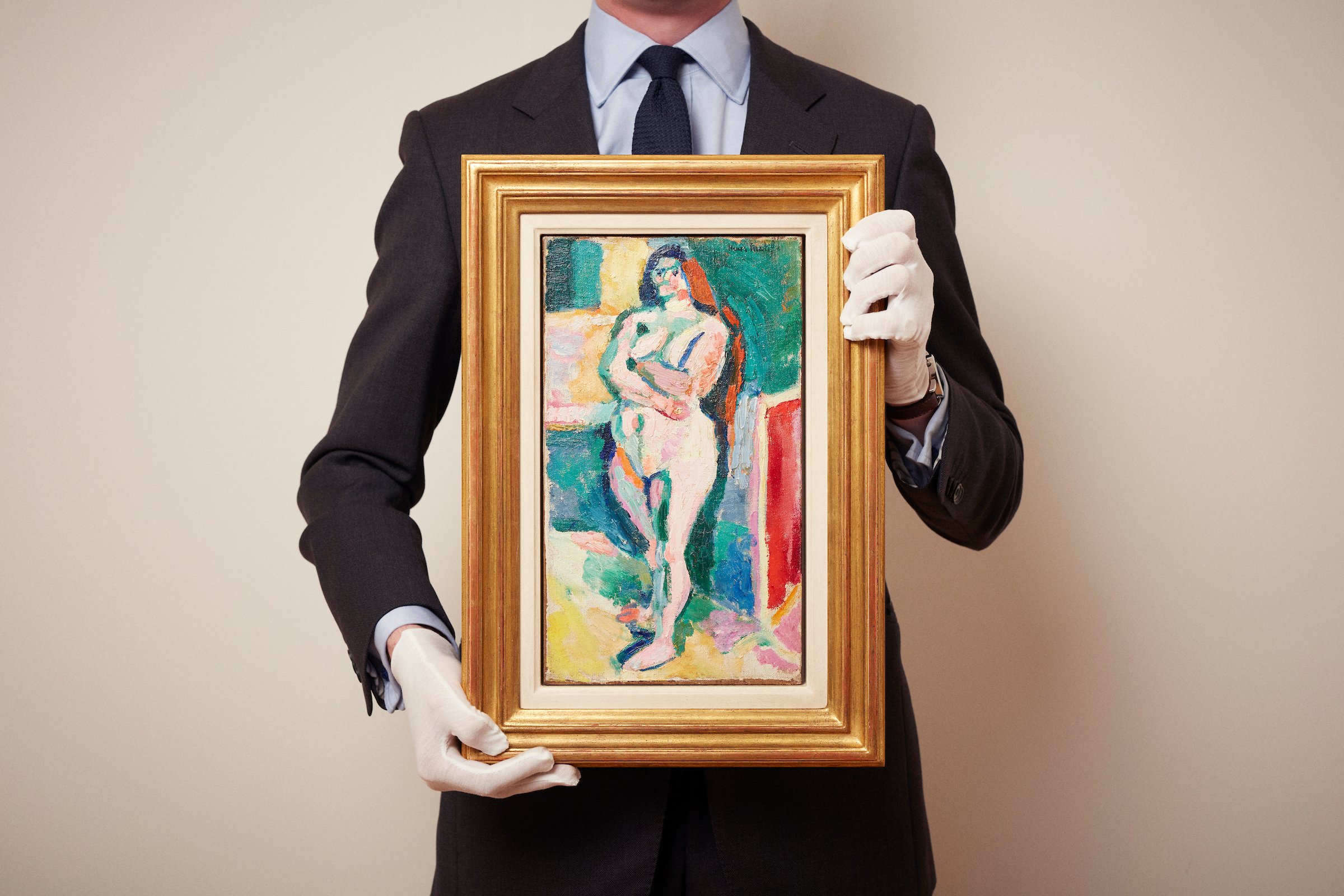
Masterpieces by Western blue-chip artists rarely go on view at museums in Hong Kong. But a growing number of them are making appearances at another venue in the city: auction houses.
Bonhams is preparing to unveil a painting by Henri Matisse, the centerpiece of its forthcoming Impressionist and Modern art sale in London, in its Hong Kong salesroom on November 3. The work is one of a number of Western trophies destined to be sold in London or New York that have begun their global tours in Asia. The trend signals shifting auction-house strategy as the axis of the market moves east.
Matisse’s Nu (femme) debout, executed between late 1905 and early 1906, carries an estimate of £1.8 million to £2.5 million ($2.5 million to $3.4 million). Its unveiling in Hong Kong marks the first time it has been shown publicly anywhere in the world since 1981.
“We have found that there is an appetite in Hong Kong to be the first to see major works by major 20th century artists,” India Phillips, Bonhams’s global head of Impressionist and Modern art, told Artnet News. “In the case of Nu (femme) debout, there was a feeling that not many works of such significance by Matisse had been seen in Hong Kong.”
The special treatment given to collectors in Asia does help drive sales, according to industry insiders. The privilege of being among the first to see works that will be sold in the west has given some potential buyers “face,” and the feel-good factor could help boost their desire to participate in the sales, said one art advisor who asked not to be named.
Sandro Botticelli’s The Man of Sorrows will be unveiled in Hong Kong as the appetite for Old Master work grows. Courtesy of Sotheby’s.
Consignors are equally keen to give their works exposure among affluent Asian audiences. The numbers explain why: Sotheby’s, Christie’s, and Phillips all reported that Asian clients accounted for around a third of their global sales in 2020. At Sotheby’s, clients from the region bought nine of the year’s top 20 lots; at Phillips, they bought five of the top 10.
“Clients are very enthusiastic about works touring to Asia—particularly Hong Kong,” Phillips said.
The strategy is not restricted to Modern and contemporary art. Sotheby’s staged a high-profile event in Hong Kong to unveil The Man of Sorrows by Sandro Botticelli ahead of its sale in January 2022, when it is expected to fetch more than $40 million. Christie’s, meanwhile, sent the Cox Collection, featuring 25 works by the likes of Caillebotte, Cézanne, and Van Gogh, to Hong Kong, Taipei, and Tokyo ahead of previews in London and New York. (It will be sold in the latter city on November 11.)
Asia’s growing appetite for Western masterpieces has not emerged out of the blue—it’s the fruit of nearly a decade of cultivation on the part of global auction houses. The trend can be traced back to 2010, when Sotheby’s staged its first selling exhibition of Impressionist and Modern art in Hong Kong, showcasing works by the likes of Picasso and Monet. Christie’s held a similar exhibition in Hong Kong in 2016, showcasing not only Imp-Mod works but also contemporary names such as Andy Warhol, Jean-Michel Basquiat, and Gerhard Richter.
Since then, sales of Western art in Hong Kong have gone up tremendously. In the first half of 2021, 967 Western works brought in over $457 million, according to the Artnet Price Database. That’s 3,700 percent more than Western art made at auction in the 13 years between 1991 and 2004—combined. In March of this year, Christie’s sold Basquiat’s Warrior for HK$323.6 million ($41.8 million), the most expensive Western work ever to be sold at auction in Asia.
Buyers from the region have also been bidding globally. At Sotheby’s recent London evening sale, an Asian collector picked up Banksy’s famed half-shredded piece Love Is In the Bin for a record £18.6 million ($25.4 million), while other Asian buyers bid fiercely for the work of young artists.
Christie’s said the first half of 2021 saw record participation from Asian buyers, who contributed a whopping 39 percent of the value of its auction sales; 34 percent of its Western art sales also came from Asian bidding.
Vincent van Gogh, Meules de Blé (1888), featured in the The Cox Collection: The Story of Impressionism evening sale on November 11 in New York. Photo: Christie’s Images Ltd 2021
The staggering growth of the Asian market—and the subsequent desire to unveil important works in the region—is the result not only of an increase in wealth across the region but also the emergence of a new generation of collectors, noted Cristian Albu, co-head of the 20th and 21st century art department at Christie’s Asia Pacific.
“[They are] tech-savvy, learn fast, knowledgeable, closely following trends in international art markets,” Albu told Artnet News, adding that social media has helped groom this new generation of collectors.
The acceleration of digitalization amid the pandemic has also contributed to the rise of Asian bidding worldwide. “We have increased the number of online sales and the offerings of Western art pieces to attract more emerging buyers,” Albu said. “Now our WeChat mini program accepts absentee bids and bids in online sales, [which] further attracts buyers, particularly from China.”
Up next is Christie’s presentation of 11 works by Basquiat during Shanghai Art Week on November 11 and 12. Billed as a non-selling exhibition, “Radiance: The Basquiat Show” will feature works by the late artist dating from 1981 to 1986. It will mark the largest presentation of Basquiat in mainland China; a similar show was staged in Hong Kong in May.
“The market in Asia for Basquiat has grown substantially over the years and we have a responsibility to form educational exhibitions around the artists and not only auctions,” Albu said. “Going forward I’m sure new records will be achieved and Asia will have a strong role to play.”